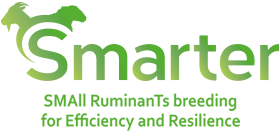
This project has received funding from the European Union’s Horizon 2020 research and innovation programme under grant agreement No 772787.
Influence of dietary protein restriction in prepubertal ewe lambs on first lactation milk traits and response to a mammary gland inflammatory challenge
– by B. Gutiérrez Gil
In light of the increasing global protein prices and considering also the need to reduce nitrogen emissions from contemporary livestock production systems, the aim of the present study was to evaluate the potential effects of a protein restriction performed in prepuberal ewes, under commercial conditions, on first lactation milk production traits and the response triggered by an experimental inflammatory challenge of the mammary gland performed at the end of the first lactation. To that end, a nutritional challenge (NC) was performed on 40 Assaf female lambs, which were divided into two groups (n=20): the control group (C), which received a standard diet for replacement lambs, and the NC group, which received the same diet but without soybean meal between 3 and 5 months of age. After the first lambing of these ewes, milk production measurements were recorded. Approximately 150 days after lambing, 24 of the 40 ewes (13 NC and 11 C) were subjected to an experimental inflammatory challenge of the mammary gland using an infusion of Escherichia coli lipopolysaccharide (LPS). Measurements of somatic cell counts (SCC) (as a local trait related to inflammation), rectal temperature and plasma concentrations of 14 cytokine/chemokine biomarkers (as systemic inflammation response traits) were collected at 11 time points from the intramammary infusion. In response to intramammary LPS inoculation, the SCC local indicator trait, rectal temperature, and five plasma biomarkers showed significant changes in basal levels across the dynamic analysis (IL-6, IL-10, CXCL8, IL-36RA and VEGF-A). The GLM analysis performed to assess the potential effect of the protein restriction on milk production traits in the replacement ewes did not show significant influences on any of the analyzed traits. Moreover, the studied diet did not significantly influence the local response measured through the somatic cell count (SCC) indicator. Regarding the systemic indicator traits, the protein restriction would have only influenced on the change regarding basal concentration levels of two of the relevant plasma biomarkers identified in response to the intramammary LPS inoculation, both of which are known to have regulatory properties of the inflammatory response (IL-10 and VEGF-A). Overall, our results would suggest that a protein restriction diet performed in replacement ewe lambs at prepuberal age may not have relevant effects on traits of major economic interest for sheep flocks, such as milk production traits and SCC. Further analyses using larger population sizes would be needed to confirm these preliminary results. The study is being prepared for submission to an international indexed journal.
Authors of the sudy : R. Pelayo a, H. Marina a, A. Suarez-Vega a, G. Hervás b, C. Esteban-Blanco a, B. Gausseres c, G. Foucras c, J.J. Arranz a, B. Gutiérrez-Gil a,1
a Departamento de Producción Animal, Facultad de Veterinaria, Universidad de León, Campus de Vegazana s/n, 24071 León, Spain.
b Instituto de Ganadería de Montaña (CSIC-University of León), Finca Marzanas s/n, 24346 Grulleros, León, Spain
c Université de Toulouse, École Nationale Vétérinaire de Toulouse (ENVT), INRAE, Interactions Hôtes – Agents Pathogènes (IHAP), F-31076, Toulouse, France.

© NEIKER

